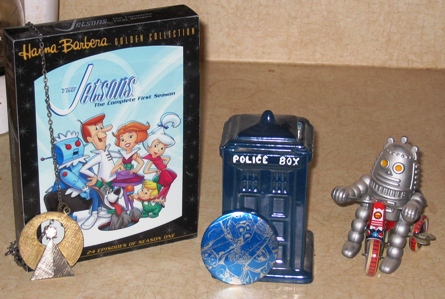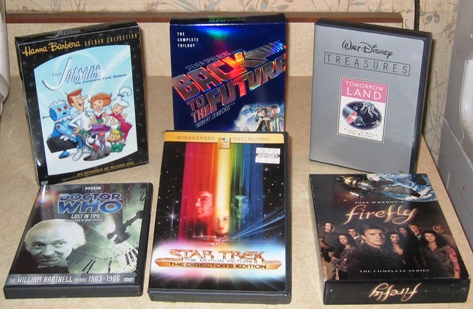Weekend Assignment #56: What will the Earth be like 50 years from now? Will global warming have swamped Florida? Will we switch to new energy sources? Will the people of the world be more prosperous, or will they be mired in a world of trouble? Look forward and predict what our children -- and their children -- will have to look forward to in 2055.
Extra Credit: Name one thing from today that people will be nostalgic for in 2055.
 "Man oh man, I love that future stuff!" - Tibby, "Shock Theater" episode of Quantum Leap
"Man oh man, I love that future stuff!" - Tibby, "Shock Theater" episode of Quantum Leap
For someone who was raised on Star Trek, who spent much of high school reading science fiction magazines, who has written professionally about Doctor Who and who longs to visit Tomorrowland circa 1955, 1959, 1967 and 2005, I don't actually think very much about what's going to happen in the real future. The fictional one can be so much fun, with the Jetsons and the Gallifreyans and the Vulcans, transmats and transporter beams, flying Deloreans and personal jetpacks, warp drive, bistromathics and the Infinite Improbability Drive, that mere reality is likely to suffer in comparison. "They promised me flying cars," as Avery Brooks famously complained in a 1990s commercial, but we're not likely to get them any time soon.
Still, here are my predictions, such as they are:
- The environment will get worse before it gets better--but eventually it will get better.
- Technology and the access to knowledge that it brings will eventually reach everyone, leading to social reform and upward mobility for the poor.
- Both of these factors will lead to less physical travel, more virtual travel for a long time to come, until certain problems can be solved.
- There will be amazingly amazing stuff we have no clue about now, but will take for granted later.
Even the most pro-business, anti-environmentalist "experts" are finally starting to admit that global warming is real, but that doesn't mean the United States will be facing up to the Kyoto accords anytime soon. At the moment, a distressing number of Republicans seem hell-bent on drilling in Alaskan nature preserves, the rewriting of clean air regulations by and for the business interests, and on and on. It doesn't seem likely that the world will wake up and smell the environmental damage until a) the negative effects of such bad policies become blatantly obvious, b) people can no longer afford to fill their gas tanks, or spend time outside without SPF-50 products, and c) someone finds a way to make money off alternative fuels, while still making them affordable to the public. It will get better eventually, but not as soon as they should. 50 years? Okay, by then, probably. We may be a few thousand species the poorer, but we'll find ways to turn things around overall, because that's what humans do.
Connections host and author James Burke has some interesting things to say about the future. In a 1998 interview, he correctly places a lot of emphasis on the impact of information technology on social institutions and the democratization of knowledge. In the short term, he predicts, "information technology is going to bring change faster than the social institutions can cope with." Because of tv, the Internet and so on, the have nots of the world increasingly know what they're missing, and they're not happy about it. At the same time, though, the Internet puts access to knowledge--and a virtual printing press--in the hands of the many for the first time in human history. Burke sees 19th century institutions such as traditional universities and traditional corporations fading away. With all that information available, he says, people will be valued more for being able to connect and synthesize knowledge across disciplines, to "make imaginative links among data," than if they overspecialize, until they "know absolutely everything about almost nothing." It's a good interview, and I recommend his books and tv shows generally. Fifty years out, he probably would see the social upheaval he predicts pretty much over with, or nearly so.
Myself, I'm less pessimistic about this aspect of it. In the seven or eight years since that interview, we've already reached the point where there are Internet cafés and bloggers in Baghdad, and terrorists communicate on web sites. In the long run, access to that wealth of information should lead to people demanding and getting social reform, and also educate them enough to finally escape endemic poverty. Along the way, people will become citizens of the world in perspective, and less stuck in the "Us and Them" dynamic.
 In terms of technology, current trends seem likely to continue for a while. Technology will get better, smaller, faster and cheaper, which should help to spread it around to more people. Eventually the internal combustion engine will have to give way to hydrogen and wind and solar and who knows what else. Unless such changes in energy sources can be applied to mass transit and long distance travel (I'd be an early adopter of a personal transporter in the Star Trek sense), people are going to travel less, replacing physical journeys with virtual ones, at least to some extent. Some major problems need to be overcome before long-distance manned space travel (i.e., outside the solar system) is possible or practical.
In terms of technology, current trends seem likely to continue for a while. Technology will get better, smaller, faster and cheaper, which should help to spread it around to more people. Eventually the internal combustion engine will have to give way to hydrogen and wind and solar and who knows what else. Unless such changes in energy sources can be applied to mass transit and long distance travel (I'd be an early adopter of a personal transporter in the Star Trek sense), people are going to travel less, replacing physical journeys with virtual ones, at least to some extent. Some major problems need to be overcome before long-distance manned space travel (i.e., outside the solar system) is possible or practical.
But who knows? I'm forty-eight years old now. How could I have known in 1965, when I was eight, what the next forty years would bring, let alone the next fifty? I remember a programmed text booklet in elementary school about the year 2050. I thought that was a neat thing to read about, but I don't recall what it actually said. I certainly didn't anticipate fax machines and laptops and blogging, or having close friends I've never actually met. I did hope for two-way wrist tvs (as in Dick Tracy) or eventually communicators (as in Star Trek), but didn't know they'd turn up as Samsung PCS phones.
So really, I can't be sure of much about 50 years from now. I may be still alive, and I pray that the Alzheimer's research that currently shows such promise will bear fruit before then. Whatever we have by then will probably be amazing, in all sorts of mundane, unpredictable ways.
But there probably still won't be flying cars. (Darn it.)
Extra Credit: I don't play video games, but it seems likely that the current generation of stand-alone games will be the source of nostalgia for the current generation of gamers. And appallingly, the people who grew up listening to hip hop will look back fondly on even the worst of that stuff (the really unmusical, misogynist, bragging, antisocial ones, not just the clever, innovative, socially responsible, rather musical pieces), just as my generation still takes guilty pleasure in Gilligan's Island. On the other hand, I doubt anyone fifty years hence will spare a moment's thought for Survivor.
Karen
For current environmental info, check out NPR's Science Friday broadcasts for 4/22/05:
www.sciencefriday.com
April 22, 2005: Hour One: Earth Day 2005: Climate Change Update / Plug-in Hybrids
April 22, 2005: Hour Two: Earth Day 2005: State of the Earth's Ecosystems / Paper or Plastic?

 You are looking at an archive edition of
You are looking at an archive edition of 



3 comments:
Karen
Wonderful, thought provoking entry as always. You never let me down, I always come way from you journal better off for having paid you a visit. Yes, we do share some of the same concerns, and when all is said and done, I prefer your outlook to mine, let's not just hope for the best, lets keep writing about it. Great, great, great entry!
Always, Carly :)
PS...I love that collection...but...where is Robbie The Robot? LOL.
I didn't know they released Firefly on DVD! I was sooo bummed when they killed that series.
You like all the things I like...one by one they are taken off tV..makes me mad...but your vision of tommorrow is I believe right on....Sandi...http://journals.aol.com/sdoscher458/LifeIsFullOfSurprises
Post a Comment